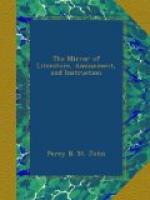which the Chancellor performed his noviciate.
The Archbishop of Canterbury came early, and was very
kindly received: he was followed by the Archbishop
of York, and several other bishops, whose attendance
gave proof that, differ as they might from Lord Brougham,
they surely did not consider him an enemy to the Church
* * *. The most remarkable visiter of that evening
was the Duke of Wellington;—the crowd was
astonished, and I dare say the Chancellor himself
was surprised, when his name was sent up—I
doubt if they had ever met in the same room before.
Their political lives, with the exception of the Catholic
Question, were one unvarying course of opposition,
if not enmity. I suspect that for a time the
Duke despised the talk of the lawyer; and, on the other
hand, Brougham had often declared, that the respect
which he entertained for military glory was not very
lofty. Some of his bitterest tirades were levelled
at the Duke personally. No one will deny that
it was high-minded in the Duke to lay aside resentment
of every sort, and offer this mark of respect as well
to the man as the office. The Chancellor was
flattered by the attention, and shook the Duke by the
hand very cordially * * *. Not the least remarkable
personage in the room was the Lord Advocate of Scotland.
Brougham and he are very old friends, and have been
much engaged in the same species of literature.
Brougham was his predecessor in the editorship of the
Edinburgh Review—a fact which is not generally
known, but which is certain. Brougham was not
the first editor, having filled that office for a
short time after Sidney Smith withdrew from the situation.
Jeffrey appeared extremely petit in his court-dress,
and did not seem very much at home: he was acquainted
with but few of his fellow visiters, and had too much
good taste to occupy much of the Chancellor’s
attention: they did not seem to hold any conversation
beyond the usual common-place inquiries * * *.
After I had paid my respects to the Chancellor, there
came tripping up the Marquess of Bristol, with a springy
step, which he must surely have acquired at the old
court of France; for I am sure that no such movement
could be attained on English ground. The elasticity
of this noble lord was such, that when once put in
motion, he continued to spring up and down in the manner
of the Chinese figures, which are hawked by the Italian
toy-venders. Had I been told that the head of
the house of Newry was a dancing-master, who had not
yet learned the present modes, I should certainly
have believed the story without scruple, if I had met
him anywhere else. He had no sooner left the
Chancellor, than he was laid hold of by a fidgetty
solicitor, who was the only member of his class in
the room, and who, I understand, is a sort of favourite
of the Chancellor. The obsequious grin, and the
affected ease of this worthy, do not convey any very
favourable impression on his behalf. He was solicitor
for the Queen, and in this capacity formed an intimacy




